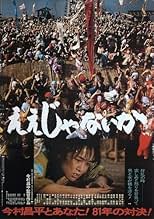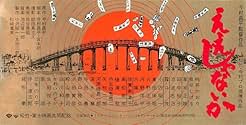Aggiungi una trama nella tua linguaNear the turbulent end of the Edo era, a man returning to Japan after exile in America searches for his wife and becomes swept up in the current of revolution in this incisive period drama f... Leggi tuttoNear the turbulent end of the Edo era, a man returning to Japan after exile in America searches for his wife and becomes swept up in the current of revolution in this incisive period drama from the great Shohei Imamura.Near the turbulent end of the Edo era, a man returning to Japan after exile in America searches for his wife and becomes swept up in the current of revolution in this incisive period drama from the great Shohei Imamura.
- Regia
- Sceneggiatura
- Star
- Premi
- 6 vittorie e 7 candidature totali
Recensioni in evidenza
This busy, hectic movie is a bit hard to follow. Like a Mardi Gras film, with political confrontation, and wild swirling colors. But not as subtle or as personal as Nianchan (My Second Brother), Unagi (The Eel) or Narayama bushiko (The Ballad of Narayama) by Shohei Imamura.
The opening film of this year's Japanese Film Festival, Shohei Imamura's Eijanaika was a mixed bag, but the opening is one to behold. Very noisy and extremely boisterous and colourful, there's a carnival like atmosphere in visiting the street markets, with its strange and curious looking circus like performers (see a snake being eaten alive, I kid you not), and others like a peep show for dirty old men.
Like the noisy nature of the street market, what I found distracting with Eijanaika is its lack of focus. Set during the time just before the Meiji Restoration, with the grip of Shoguns going into decline, and with foreign powers already set foot on the land of the rising sun, it has many facets on the corrupt ways and the power play between warlords, scheming and plotting against each other to gain a foothold of fame and fortune.
But anchoring the movie is the theme of love between the characters Genji (Shigeru Izumiya) and Ine (Kaori Momoi), though it's a strange love, which only gets weirder once it addresses its issue on jealousy, and embarks on a journey of manipulation, and sacrifice. Genji has spent 6 years in America, and upon arrival in Japan, finds himself like a fish out of water. He looks up his abandoned wife Genji, who is now a top performing showgirl in one of those peep shows, being sold against her wishes to a master, and has to pay off her debt. But this master-performer relationship might be more than meets the eye as Genji finds out, given her reluctance to leave with him and follow a dream of carving out a new life in America.
Somehow you'll loathe Ine's character, that slowly and surely you discover that she's quite a loose woman, using her charms and body to exact her wishes. But you doubt her true love for Genji no longer when you witness the amount of crap she has to go through for her man, despite his being unappreciative of the fact initially (though it's hard of course). Living a new life and going out of her comfort zone might be too much for the unskilled Ine, and perchance that's why the spurning of Genji's dream to live abroad, going back to where he came from and had experienced.
Like I mentioned, the narrative felt a bit too scattered with many characters and subplots, involving diabolical scheming no less, to give it a easier flow to follow. But appreciated was the fact that Imamura had instilled within the film some physical comedy involving a band of robbers, who after experiencing the success of their first hit, couldn't conceal their addiction for more.
The finale reminded me of Paprika, with plenty of song, dance, color and sheer shenanigans, involving mooning and peeing (this you just gotta see), but I thought it lost the plot with its firing on all cylinders on all parts of the target, rather than zooming in on critical areas and grouping the shots.
Like the noisy nature of the street market, what I found distracting with Eijanaika is its lack of focus. Set during the time just before the Meiji Restoration, with the grip of Shoguns going into decline, and with foreign powers already set foot on the land of the rising sun, it has many facets on the corrupt ways and the power play between warlords, scheming and plotting against each other to gain a foothold of fame and fortune.
But anchoring the movie is the theme of love between the characters Genji (Shigeru Izumiya) and Ine (Kaori Momoi), though it's a strange love, which only gets weirder once it addresses its issue on jealousy, and embarks on a journey of manipulation, and sacrifice. Genji has spent 6 years in America, and upon arrival in Japan, finds himself like a fish out of water. He looks up his abandoned wife Genji, who is now a top performing showgirl in one of those peep shows, being sold against her wishes to a master, and has to pay off her debt. But this master-performer relationship might be more than meets the eye as Genji finds out, given her reluctance to leave with him and follow a dream of carving out a new life in America.
Somehow you'll loathe Ine's character, that slowly and surely you discover that she's quite a loose woman, using her charms and body to exact her wishes. But you doubt her true love for Genji no longer when you witness the amount of crap she has to go through for her man, despite his being unappreciative of the fact initially (though it's hard of course). Living a new life and going out of her comfort zone might be too much for the unskilled Ine, and perchance that's why the spurning of Genji's dream to live abroad, going back to where he came from and had experienced.
Like I mentioned, the narrative felt a bit too scattered with many characters and subplots, involving diabolical scheming no less, to give it a easier flow to follow. But appreciated was the fact that Imamura had instilled within the film some physical comedy involving a band of robbers, who after experiencing the success of their first hit, couldn't conceal their addiction for more.
The finale reminded me of Paprika, with plenty of song, dance, color and sheer shenanigans, involving mooning and peeing (this you just gotta see), but I thought it lost the plot with its firing on all cylinders on all parts of the target, rather than zooming in on critical areas and grouping the shots.
Shohei Imamura's "Eijanaika" is an awesome film -- much better than I expected. This is a film painted on a much bigger canvas than Imamura's norm -- it's rather reminiscent of Dickens's "Barnaby Rudge", albeit with humor, nudity and sex. It is set in the turbulent last days of the Shogunate, and has a large number of characters one must try to keep track of -- something I didn't find that hard to do. Whatever it lacks in "subtlety", it makes up for in exuberance.
It's 1866. Genji returns to Japan after six years in America. He's told that his wife had been sold. It's the turbulent end of the Edo era but filmmaker Shôhei Imamura follows the lowly common man.
I am interested in Genji and Ine. I like this lower class Japan. It's not something that I've seen before. The story is somewhat chaotic. There is a lot going on. I would like to have less. I do like the crass ugliness and its beauty. This has good energy.
I am interested in Genji and Ine. I like this lower class Japan. It's not something that I've seen before. The story is somewhat chaotic. There is a lot going on. I would like to have less. I do like the crass ugliness and its beauty. This has good energy.
With its shattered scattered narrative, gritty visual and witty music, EIJANAIKA seems to give the truer picture of a time in Japanese history than any typical period picture with standard parameters would have. However, to get this impression of this two-and-a-half hour long film, one needs patience, interest in Imamura's work (It helps if one has seen and liked either Eeel, Vengeance, Narayama, or all of them) and liking for Japanese cinema. The start is very gripping. And its chaotic, musical, darkly funny finale remains one of the more memorable scenes involving mayhem one would encounter in a film from any timezone. It reminded me of the angry-crowd-flying-into-the-air end sequence of Vittorio De Sica's "Miracle In Milan". Overall it's fun to watch Imamura and his crew ("Stop, you funny Showmen! Or I'll Shoot" the ensemble is threatened)lending a musical ear to history.
Lo sapevi?
- ConnessioniFeatured in Cinéma, de notre temps: Shohei Imamura, le libre penseur (1995)
I più visti
Accedi per valutare e creare un elenco di titoli salvati per ottenere consigli personalizzati
Dettagli
Contribuisci a questa pagina
Suggerisci una modifica o aggiungi i contenuti mancanti





















